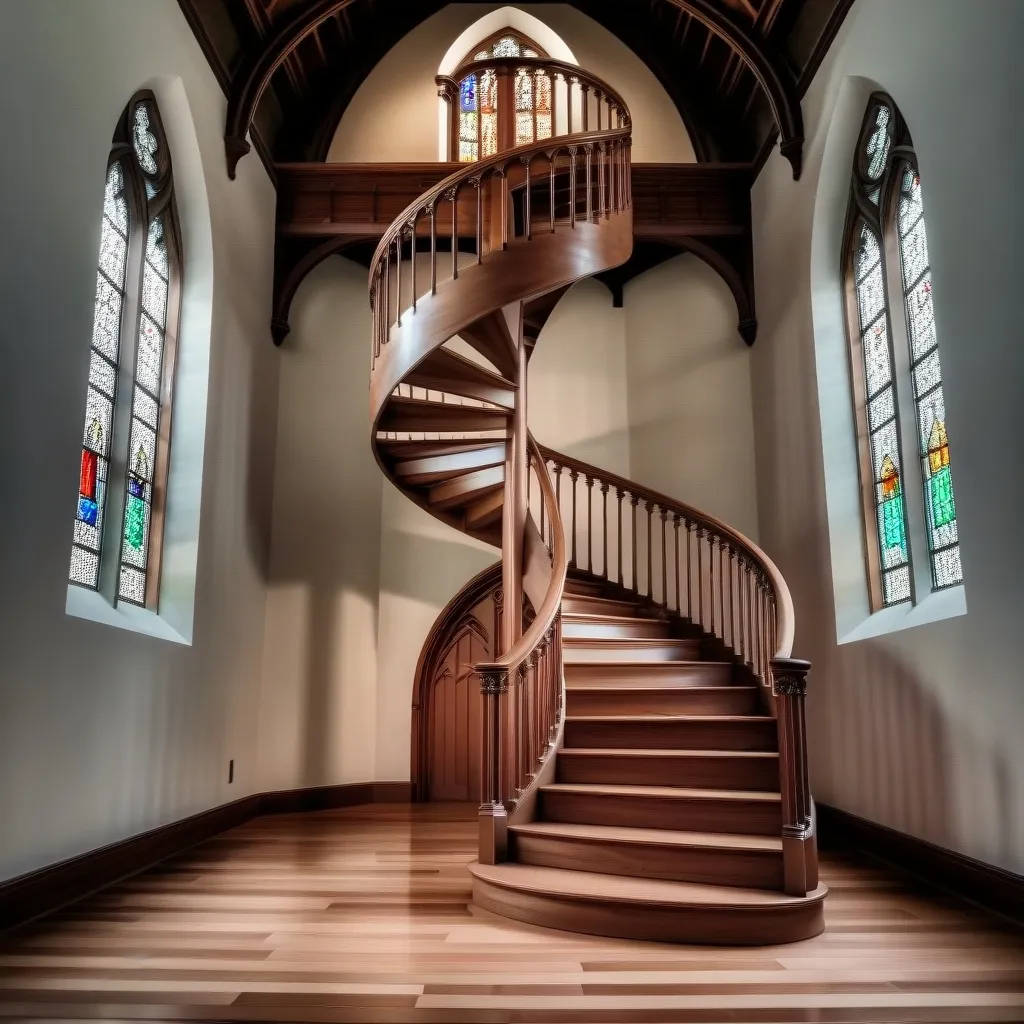The Miraculous Staircase of Loretto Chapel: A Blend of Mystery and Marvel
Nestled in the heart of Santa Fe, New Mexico, stands a testament to faith, engineering, and mystery - the Loretto Chapel. This quaint Gothic-style church might seem unassuming at first glance, but it houses one of the most puzzling architectural wonders of the modern world: the Miraculous Staircase.
Picture this: a beautiful chapel, meticulously designed and built, but with one glaring oversight - no way to access the choir loft. It’s like building a treehouse without a ladder. That’s exactly the predicament the Sisters of Loretto found themselves in back in 1878. Talk about an “oops” moment for the architects!
So, what did the sisters do? They turned to good old-fashioned prayer. For nine days straight, they pleaded to St. Joseph for a solution. And boy, did they get one! On the last day of their prayer marathon, a mysterious stranger showed up at their doorstep, tools in hand, ready to build them a staircase.
Now, this wasn’t just any run-of-the-mill carpenter. This guy worked in complete secrecy, using only hand tools, and didn’t consult anyone about his plans. It’s like he walked straight out of a DIY show from another dimension.
The result? A staircase that defies logic and leaves engineers scratching their heads to this day. This spiral wonder makes two complete 360-degree turns as it ascends to the choir loft. But here’s the kicker - it has no central support! Nada. Zilch. It’s like it’s held up by sheer willpower and maybe a sprinkle of magic.
And get this - there’s not a single nail, screw, or drop of glue holding it together. The entire structure is joined by wooden pegs. It’s like the world’s most intricate game of Jenga, except this one doesn’t topple over.
The staircase has 33 steps, which is pretty interesting when you think about it. That’s the age Jesus was when he was crucified. Coincidence? Maybe. But it’s also a number that holds significance for the Freemasons. Cue the conspiracy theories!
Even the wood used in the staircase is shrouded in mystery. It’s some type of spruce, but not any kind native to New Mexico. It’s like this carpenter went on a secret wood-hunting expedition before starting his project.
Now, you’d think a staircase this incredible would have made its builder famous, right? Wrong. As soon as he finished his masterpiece, our mystery carpenter vanished into thin air. He didn’t even stick around for a “thank you” or a paycheck. Talk about a humble genius!
The Loretto Chapel has since become a hotspot for tourists and architecture enthusiasts alike. Millions of people flock to Santa Fe each year just to catch a glimpse of this miraculous staircase. It’s like the Eiffel Tower of staircases, minus the long queues and overpriced souvenirs.
Interestingly, the staircase wasn’t always as safe as it looks now. When it was first built, it had no railings. Can you imagine climbing a spiral staircase with no handrails? The poor nuns and students often resorted to crawling up the stairs on all fours. Talk about a leap of faith! It wasn’t until 1887 that another carpenter added the railings, probably after witnessing one too many white-knuckle ascents.
The Miraculous Staircase has stumped even the brightest minds in engineering. A renowned physicist once studied it and suggested that its double helix design might be the secret to its stability. But even that doesn’t fully explain how this architectural anomaly stands so sturdy after all these years.
It’s not just the construction that’s impressive, but also the precision. The staircase fits perfectly within the chapel, making optimal use of the limited space. It’s like the mysterious carpenter had X-ray vision and could see exactly how to make it all work.
The story of the Loretto Chapel staircase is more than just an architectural curiosity. It’s a tale that touches on faith, mystery, and the limits of human understanding. Whether you believe it’s a divine miracle or a stroke of engineering genius, there’s no denying its allure.
Some skeptics have tried to demystify the staircase over the years. They’ve proposed theories about hidden supports or secret techniques. But so far, none of these explanations have stuck. The Miraculous Staircase remains as enigmatic as ever.
One of the most intriguing aspects of this story is how it brings together different worlds. It’s a meeting point of religion and science, of faith and engineering. It challenges us to consider that maybe, just maybe, there are some things in this world that defy easy explanation.
The impact of the staircase goes beyond its physical presence. It’s become a symbol of hope and wonder for many. People from all walks of life visit the chapel, each taking away their own interpretation of what they’ve seen.
It’s also a reminder of the incredible craftsmanship of bygone eras. In our age of mass production and quick fixes, the Miraculous Staircase stands as a testament to the power of skilled handiwork and attention to detail.
The mystery surrounding the carpenter has led to all sorts of speculation. Some believe he was St. Joseph himself, answering the sisters’ prayers in person. Others think he might have been a master craftsman from Europe, perhaps even the legendary French carpenter Francois-Jean “Frenchy” Rochas. But like all good mysteries, the truth remains elusive.
The staircase has inspired countless artists, writers, and filmmakers over the years. It’s been the subject of documentaries, featured in movies, and written about in numerous books. It’s like the architectural equivalent of a celebrity, always in the spotlight.
What’s particularly fascinating is how the staircase continues to captivate people in our modern, technology-driven world. In an age where we can 3D print houses and build skyscrapers that touch the clouds, this simple wooden staircase still manages to leave us in awe.
The Loretto Chapel itself is a beautiful piece of architecture, with its Gothic revival style and intricate details. But it’s the staircase that steals the show. It’s like the chapel was built just to house this incredible structure.
Visitors to the chapel often report a sense of peace and wonder when they see the staircase. There’s something about its graceful spiral and seemingly impossible construction that touches people on a deep level.
The story of the Miraculous Staircase also serves as a powerful metaphor. It reminds us that sometimes, when we’re faced with seemingly insurmountable problems, solutions can come from the most unexpected places.
In the end, whether you see it as a miracle, a masterpiece of engineering, or both, the Miraculous Staircase of Loretto Chapel continues to inspire and amaze. It stands as a testament to human ingenuity, the power of faith, and the enduring allure of a good mystery.
So, next time you’re in Santa Fe, why not take a trip to the Loretto Chapel? Who knows, you might just find yourself climbing the stairway to heaven - or at least, to a really cool choir loft.






